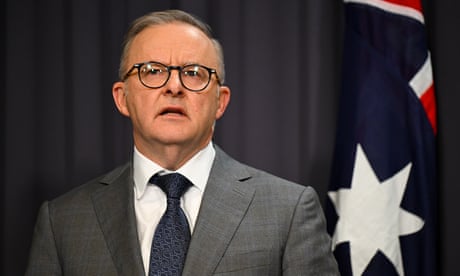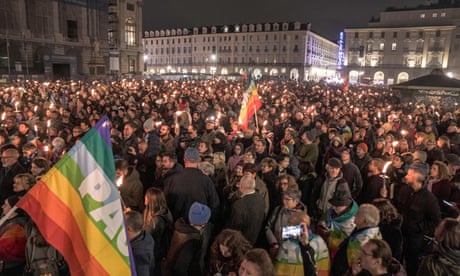Extract from The Guardian
On 6 October, Anthony Albanese visited the Lakemba Mosque. The prime minister, then in the closing stages of a losing referendum campaign, was rallying support from churches for the voice to parliament. Albanese told the local community he had been “deeply moved” by how strongly Australians of Muslim faith had rallied in support of the constitutionally enshrined advisory committee for Indigenous people. It was a significant bit of outreach, and signalling.
But on 7 October, all hell broke loose in Israel. Hamas militants swarmed over the border from Gaza to slaughter innocent civilians, including young people at a music festival. Military bases were attacked and hundreds of people were taken as hostages. Gut-wrenching images of carnage and deep psychological distress flooded news outlets. The world held its breath. Given the barbaric nature of the attack, the Netanyahu government was always going to respond with lethal force.
Australia’s response to rapidly unfolding events came, in the first instance, from the foreign affairs minister. Penny Wong condemned the Hamas attacks unequivocally and upheld Israel’s right to defend itself. Understanding precisely what would come next, Wong also called for restraint and the protection of civilian life.
The next morning, Albanese fronted the ABC. I was on the Insiders panel that Sunday and watched as the prime minister left the green room to get minute-by-minute updates from Israeli diplomats away from prying journalistic ears. When he fronted the program, the prime minister upheld Israel’s right to self-defence. Asked whether or not he was concerned about what would come next, Albanese said “of course people are worried about escalation”. He added the attack from Hamas was without precedent.
Peter Dutton hardly wasted a second. He blasted the government for countenancing restraint. This clap back domestically was a clear statement of intent: the Liberal leader intended to weaponise any form of words that wasn’t “Israel is entirely justified in whatever it chooses to do next”.
The Greens also limbered up at the other end of the political spectrum. On 8 October, Jordon Steele-John, the party’s spokesperson on foreign affairs, said the Hamas attack violated international law. But he said the context of the escalating conflict could not be ignored. “For there to be peace there must be an end to the state of Israel’s illegal occupation of the Palestinian territories,” Steele-John said.
Dutton sensed opportunity because Labor’s policy positions on Middle East have been in flux. When substantive things are moving, it’s always hard to maintain simple messages. The Greens also saw political opportunity, because while Labor has been trending towards projecting a more pro-Palestine position, how far to go, and in what context, remains a matter of internal debate.
Labor’s national conference has endorsed a resolution calling on the government to recognise Palestine as a state. But Wong has declined to nominate a timetable for when that might happen. The government has also reversed Scott Morrison’s decision to recognise West Jerusalem as Israel’s capital. When the shift was revealed, Israel’s foreign ministry summoned the Australian ambassador for a diplomatic dressing down.
Labor has also returned to calling Gaza and the West Bank “Occupied Palestinian Territories”. In August, Wong told the Labor caucus the government was “strengthening its opposition to settlements by affirming they are illegal under international law and a significant obstacle to peace”. This shift, ahead of another Labor national conference, was based on advice from the Department of Foreign Affairs and Trade, as my colleague Daniel Hurst revealed last month. Officials had told Wong in February tensions in Israel and the Palestinian territories were increasing “with further violence, an expansion of Israel’s settlement enterprise and more civilian deaths expected”. The whole region was a tinderbox in other words. Resolving how and when to adjust the language, evidently, took months.
A nuanced conversation says Israel and Palestine both have a right to exist behind settled and secure borders ... But people lack the energy for an international relations seminar when their homelands resemble killing fields
Then, the act of terror happened in early October. The war which has followed has inflicted severe trauma on diaspora communities in Australia. People with relatives in Israel wonder whether the hostages will ever be freed. They wonder how many people will die. Jewish communities harbour legitimate fears for their safety in Australia given a heightening of community tensions, and the return of virulent antisemitism.
Given the desperate humanitarian situation in Gaza, given Israeli forces are closing in on the centre of Gaza City, given the death toll has now reached more than 10,000 people, including more than 4,000 children, given humanitarian “pauses” have been a while coming – Australian-Palestinian communities in Labor’s electoral heartland are also in a state of acute despair.
Traumatised people lack the bandwidth for nuanced conversation about the foundational rights and wrongs supercharging the current conflict. A nuanced conversation says Israel and Palestine both have a right to exist behind settled and secure borders; that principle lies at the heart of the two-state solution. But people lack the energy for an international relations seminar when their homelands resemble killing fields. The emotion is red raw.
If we look at recent local protests in support of Palestinians trapped in Gaza, fury is being directed specifically at the prime minister – a lifelong leftwinger with a significant history of support for Palestine. Before Albanese departed for China last week, protesters in Melbourne were brandishing signs – “Albanese blood on your hands”, “Albanese can’t hide, you’re supporting genocide”, “Albo, you coward, blood on your hands”.
Mass demonstrations about established causes and controversies always attract broader protest groups and movements, so some of the current activity will reflect a broad left critique of the incumbent Labor government. But Albanese is clearly facing a backlash in parts of the Australian-Palestinian community. Some in the community evidently feel abandoned by a government that had seemed to be listening and adjusting language and policy positions.
Let’s return now to the Lakemba Mosque to make the point. When Albanese went to thank members of the Islamic community for supporting the recognition of Australia’s First Nations peoples, the prime minister said he had recently heard a teacher explaining why it was important for Muslims to be an ally for Aboriginal and Torres Strait Islander peoples. The teacher, Saja Alam, had told SBS, “to be a Muslim is to stand for justice”. The sentiment in communities at present is the Albanese government isn’t standing sufficiently for justice for Palestine and Palestinians.
The House of Representatives will sit on Monday. Albanese will be back in Canberra after completing successful visits in the US and China and the Pacific. The prime minister and the foreign minister are already hearing this feedback from MPs about the anger among Palestinian Australians. Next week, I suspect, the leadership will hear more of it.
Over the past couple of weeks, we’ve watched Albanese thread a needle between two superpowers locked in strategic competition with one another to advance their own interests: China and the US. That’s been quite the diplomatic dance. Albanese went from settling diplomatic hostilities in Beijing to attempting to hold the Pacific within Australia’s sphere of influence, telling island states Australia needs to be their partner of choice. Australia, not China, was implied rather than stated.
The prime minister needs to exhibit similar domestic dexterity with this issue. Australia is not a player in Middle East politics globally – anyone who pretends otherwise is having a lend of you. But the domestic fallout from a war in that region has significant implications for social cohesion domestically. There will be lots of punditry about what Labor stands to lose electorally if it turns its back on these communities. But there’s a more important imperative in play. Leaders need to keep their countries together in dangerous and polarised times.
Speaking of social cohesion in Australia, authoritative research suggests it has been on the decline since the country navigated the darkest days of the Covid-19 pandemic. In 2022, the Scanlon Foundation’s Social Cohesion report – a research project that has mapped the mood of a multicultural nation since 2007 – put sentiment at a tipping point.
The main reason for the negative shift was changing economic circumstances. Inflation had roared back, and financial wellbeing is the strongest predictor of social cohesion identified in the survey.
The 2023 survey will be out next week.
It will be fascinating to see what it says.


No comments:
Post a Comment